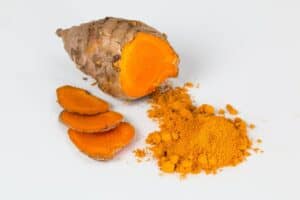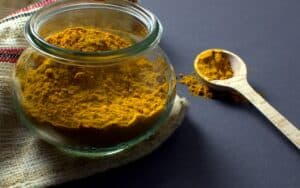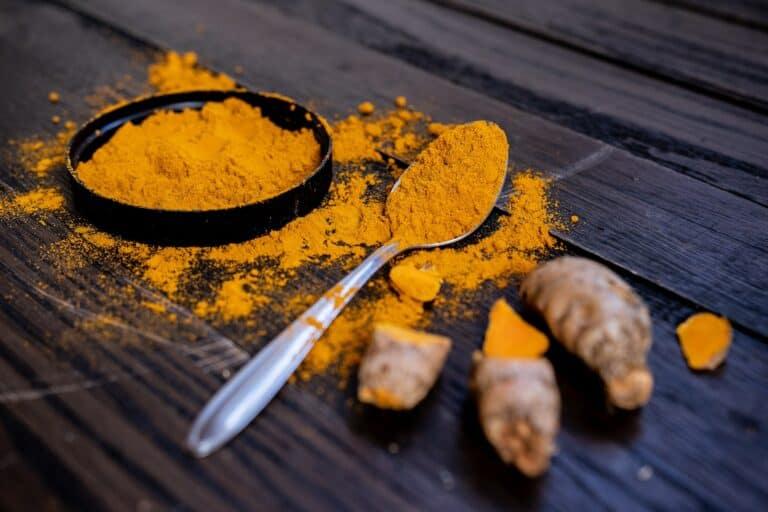In the world of spices, few hold the same allure and reputation as turmeric. Beyond its vibrant golden hue and robust flavor, turmeric is hailed for its incredible health benefits. From combating chronic inflammation to potentially fighting cancer, turmeric’s therapeutic potential knows no bounds. In this comprehensive guide, we will delve deep into the myriad health benefits of turmeric, exploring the science behind its power and practical ways to incorporate it into your daily life.
What Is Turmeric?
Let’s start at the beginning. Turmeric, scientifically known as Curcuma longa, is a rhizomatous herbaceous perennial plant belonging to the ginger family. Native to South Asia, particularly India, and cultivated across tropical regions, turmeric has a rich history dating back thousands of years.
Traditionally used as a spice, turmeric’s warm and earthy flavor has earned it a permanent place in the kitchens of many cultures. It’s a key ingredient in curry powder, giving dishes that distinctive yellow color and a depth of flavor that’s hard to match.
Beyond the culinary realm, turmeric plays a starring role in traditional medicine systems, such as Ayurveda. Its use in healing dates back over 4,000 years, where it was considered a natural remedy for a variety of ailments.
The Magic of Curcumin: Turmeric’s Active Ingredient

At the heart of turmeric’s health benefits lies its active compound, curcumin. This polyphenol is responsible for the spice’s brilliant color and a plethora of its health-promoting effects.
Curcumin’s Potential Benefits:
- Anti-Inflammatory: Curcumin has potent anti-inflammatory properties, making it a potential natural remedy for chronic inflammation.
- Antioxidant: It’s also a powerful antioxidant, helping to combat oxidative stress and free radical damage.
- Brain Health: Curcumin may enhance brain function and even play a role in preventing age-related brain disorders.
- Cancer Fighter: Some studies suggest that curcumin can inhibit the growth of cancer cells.
Curcumin supplements have gained popularity for their concentrated curcumin content. However, it’s essential to choose high-quality supplements to ensure you’re getting the full benefits.
Turmeric’s Anti-Inflammatory Arsenal
Chronic inflammation is at the root of many chronic diseases, including heart disease, cancer, and Alzheimer’s. Turmeric, with its potent anti-inflammatory properties, has shown promise in managing and preventing these conditions.
The active compound curcumin inhibits inflammatory pathways at the molecular level, reducing the production of inflammatory cytokines. This action makes it a potent ally against chronic inflammation.
One condition that benefits from turmeric’s anti-inflammatory prowess is rheumatoid arthritis. This autoimmune disorder causes joint pain and inflammation. Studies suggest that curcumin’s anti-inflammatory effects can help ease symptoms and improve the quality of life for those with rheumatoid arthritis.
Antioxidant Properties: Shielding Your Health

Antioxidants are the body’s natural defense against oxidative stress, which can lead to cell damage and various chronic diseases. Turmeric, particularly curcumin, is a superstar in the world of antioxidants.
By neutralizing harmful free radicals, curcumin helps protect our cells and DNA from damage. This antioxidant action is thought to contribute to many of turmeric’s health benefits, including its potential role in cancer prevention.
Turmeric and Cancer: A Promising Connection
Cancer, a complex and devastating disease, is a global health challenge. While there is no miracle cure, the potential cancer-fighting properties of curcumin have generated significant interest among researchers.
Curcumin’s anti-inflammatory and antioxidant properties may play a role in preventing cancer. Some studies have shown that it can inhibit the growth of cancerous cells and even induce apoptosis, a process where cancer cells self-destruct.
However, it’s important to note that while these findings are promising, more research is needed to fully understand the extent of curcumin’s impact on cancer prevention and treatment.
Guarding Your Heart: Turmeric and Cardiovascular Health
Cardiovascular disease remains the leading cause of death worldwide, making heart health a top priority for many. Turmeric may offer a natural way to support cardiovascular health.
The antioxidant and anti-inflammatory properties of curcumin can help protect blood vessels, reduce plaque buildup, and improve endothelial function. Endothelial function is crucial for maintaining healthy blood pressure and preventing atherosclerosis.
Recent research even suggests that turmeric could be beneficial for patients undergoing coronary artery bypass surgery, helping to reduce the risk of post-surgery complications.
Balancing the Digestive System: Turmeric’s Soothing Effect

Digestive issues, such as inflammatory bowel disease (IBD), can be debilitating and affect one’s quality of life. Turmeric’s anti-inflammatory properties may offer relief to those suffering from these conditions.
Curcumin’s ability to reduce inflammation in the gut lining can help alleviate symptoms like abdominal pain, diarrhea, and bloating. Incorporating turmeric into your diet, whether through curries or turmeric tea, can provide a soothing effect on your digestive system.
It’s worth noting that while turmeric is generally safe, some individuals may experience acid reflux or other gastrointestinal discomfort when consuming it in large quantities. If you have any concerns, consult with a healthcare professional.
Turmeric and Brain Health: Curcumin’s Cognitive Potential
Maintaining brain health is a priority as we age, and turmeric may offer some intriguing possibilities in this regard. One key player in brain function is Brain-Derived Neurotrophic Factor (BDNF).
BDNF is a growth hormone that functions in the brain, promoting the survival and growth of nerve cells. Low levels of BDNF are associated with various brain disorders, including depression and Alzheimer’s disease.
Curcumin has shown the potential to increase BDNF levels in the brain. This could have significant implications for mental health and may even play a role in preventing or managing major depressive disorder.
Additionally, curcumin’s ability to enhance neurogenesis (the production of new nerve cells) could be beneficial for common brain disorders like Alzheimer’s.
Traditional Wisdom Meets Modern Science: Turmeric in Traditional Medicine
Turmeric’s use in traditional medicine systems, particularly Ayurveda, spans millennia. In Ayurveda, turmeric is considered a versatile herb with a wide range of applications.
One aspect of turmeric’s traditional use aligns with modern scientific findings—the promotion of vascular endothelial function. Healthy endothelial function is essential for maintaining flexible and healthy blood vessels, which is crucial for overall cardiovascular health.
Curcumin and Integrative Health: A Potent Anti-Inflammatory Ally
As more people seek holistic approaches to health, complementary and integrative health practices have gained popularity. Turmeric’s potent anti-inflammatory properties make it a valuable addition to integrative health strategies.
Studies have shown that curcumin can influence transcriptional interactions related to inflammation, potentially leading to reduced inflammatory responses in the body. This makes turmeric a compelling option for those looking to address chronic diseases from multiple angles.
Turmeric and Joint Health: Easing the Pain of Arthritis
Arthritis, a group of painful and degenerative conditions affecting the joints, can severely impact one’s quality of life. Turmeric’s anti-inflammatory properties offer hope to those suffering from joint pain and arthritis.
Curcumin’s ability to reduce inflammation and oxidative stress in the joints can help alleviate pain and improve joint function. Many individuals with arthritis have found relief through turmeric supplementation or by incorporating it into their diets.
Boosting the Immune System: Turmeric’s Defense Mechanisms
A robust immune system is vital for protecting the body against infections and diseases. Turmeric may play a role in bolstering the immune response.
Curcumin’s immunomodulatory effects can enhance the activity of immune cells, helping the body defend itself against pathogens. Studies involving human volunteers have shown promising results, suggesting that turmeric could be a valuable addition to immune-boosting strategies.
Cancer and Curcumin: A Glimpse into Research Results
Cancer, a complex and challenging disease, demands a multifaceted approach to treatment and prevention. Curcumin, with its anti-inflammatory and antioxidant properties, has become a subject of intense research in the fight against cancer.
Turmeric extracts, rich in curcumin, have been studied for their potential to inhibit the growth of various cancer cells. While these findings are encouraging, it’s crucial to remember that more research is needed before curcumin can be considered a primary cancer treatment.
From Brain Inflammation to Liver Health: Turmeric’s Wide Spectrum

The versatility of turmeric extends to its potential in addressing various health issues. From brain inflammation to liver health, curcumin’s effects on different systems are fascinating.
Turmeric’s anti-inflammatory properties may help combat brain inflammation, which is implicated in several neurological disorders. By reducing inflammation in the brain, turmeric could potentially play a role in protecting against conditions like Alzheimer’s disease.
Additionally, curcumin has shown promise in liver disease prevention and management. The antioxidant and anti-inflammatory properties of turmeric can support liver function and protect against liver damage.
Clinical trials are ongoing, shedding light on the precise mechanisms by which turmeric exerts its effects in these areas.
Beyond the Basics: Turmeric’s Holistic Health Impact
Turmeric’s impact on human health extends far beyond its well-known anti-inflammatory and antioxidant properties.
Insulin Resistance: Insulin resistance is a hallmark of type 2 diabetes. Curcumin may help improve insulin sensitivity, making it a potential ally in diabetes management.
Digestive Health: Turmeric’s soothing effects on the digestive system can help alleviate common issues like indigestion and bloating.
Endothelial Function: Healthy endothelial function is essential for maintaining flexible and healthy blood vessels. Turmeric can help support this vital aspect of cardiovascular health.
A Look at the Science: Systematic Review of Turmeric’s Impact
The scientific community has taken a keen interest in turmeric’s health benefits, resulting in a wealth of research studies. These studies have provided valuable insights into how turmeric affects various aspects of human health.
One fascinating area of research is the impact of turmeric on transcriptional interactions. These interactions involve the regulation of gene expression, and curcumin’s influence on them could have far-reaching effects on our health.
Turmeric and You: Practical Tips for Incorporation
Now that we’ve explored the science and potential health benefits of turmeric, how can you incorporate this golden spice into your daily life?
Turmeric Supplements: If you opt for supplements, ensure they are of high quality, and consult with a healthcare professional for guidance on dosage.
Dietary Inclusion: Cooking with turmeric is a delicious way to enjoy its benefits. Experiment with curries, soups, and stews, adding a pinch of turmeric for both flavor and health.
Turmeric Tea: Turmeric tea, often known as “golden milk,” is a soothing and nutritious beverage. You can find various recipes online to make your own at home.
Delicious Dishes: Explore recipes that feature turmeric as a star ingredient, such as turmeric-spiced roasted vegetables or a fragrant turmeric-infused rice dish.
Health Benefits of Turmeric: Embrace the Golden Healer
As we conclude our journey through the world of turmeric and its incredible health benefits, one thing is clear—nature’s golden healer has much to offer. From reducing inflammation and fighting cancer to supporting brain function and heart health, turmeric is a potent ally in our quest for well-being.
Its rich history in traditional medicine systems, coupled with the growing body of scientific research, underscores its importance in the world of holistic health. Turmeric’s versatility, from culinary use to dietary supplements, allows people of all walks of life to embrace its goodness.
So, whether you add a dash of turmeric to your next meal or explore the world of curcumin supplements, remember that turmeric is not just a spice—it’s a golden ticket to a healthier, more vibrant you
Other suggested articles:

